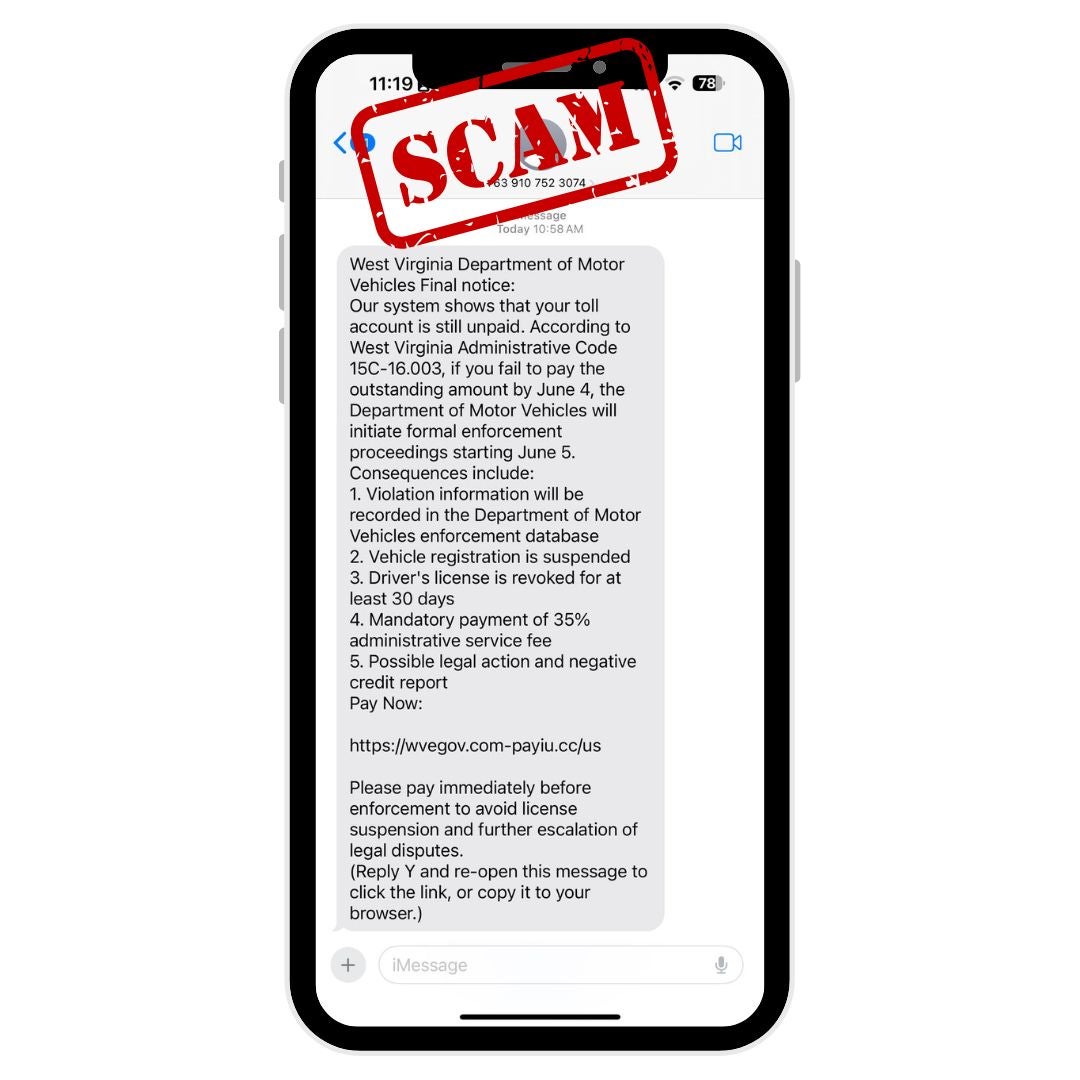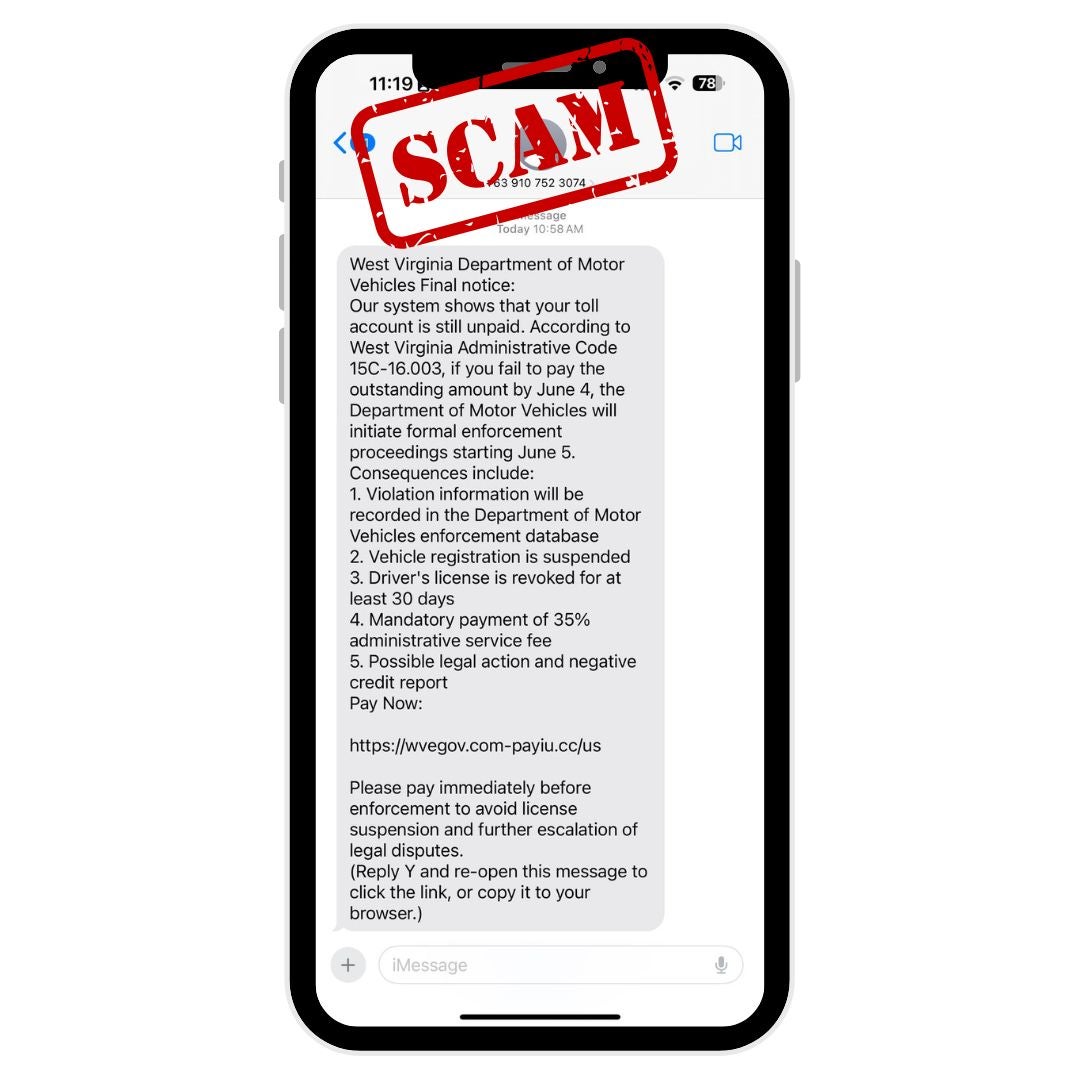West Virginia Attorney General JB McCuskey is warning consumers about fraudulent text messages claiming to be from the West Virginia Division of Motor Vehicles (DMV). The scam texts threaten legal action or financial penalties for unpaid tolls or traffic tickets and direct recipients to fake websites to steal personal information or money.
Government agencies do not conduct business via text message—consumers should delete these messages immediately and report them as scams. The Consumer Protection Division of the West Virginia Attorney General’s Office has recently received multiple complaints about text claiming to be from the DMV.
“We have gotten many reports of people receiving these texts and, unfortunately, some falling for the scam,” Attorney General McCuskey said. “We want to make sure all West Virginians know that Government business is almost always sent via the U.S. Postal Service and never through text. We are investigating the scam texts and are attempting to shut down the URLs associated with the scheme.”
The DMV text scam represents a concerning example of what cybersecurity experts call "smishing." Smishing is where criminals use fraudulent text messages to manipulate recipients into downloading harmful software, divulging personal information or sending money directly to scammers.
This newest scam is similar to many sham texts that tell people they must pay money or face consequences such as suspended driver’s license, legal action or a negative credit report. Scammers may cite West Virginia Code or “West Virginia Administrative Code” and include legitimate-looking websites where they try to deceive recipients into paying for an unpaid toll or traffic ticket.
There are tell-tale signs that indicate a text is fake. Consumers can follow these tips to avoid becoming a victim. Look for:
- Legitimate looking, but incorrect agency information. For example, many who have received these texts have reported getting a text from the “West Virginia Department of Motor Vehicles” when the correct name is the West Virginia Division of Motor Vehicles.
- Threats of legal action or financial consequences if the toll or ticket is not paid.
- Incorrect or unusual grammar.
- Requests for you to verify your personal or payment information.
- URLs that begin with what looks like a legitimate website but have unusual spelling or extra characters at the end. Example: https://transportation.wv.gov-jsbg.icu/pay
If consumers receive a text message with any of these characteristics, it’s a scam. Consumers can follow the recommendations below to minimize your chances of falling victim to this text scam:
- NEVER click links from or reply to unsolicited texts or call numbers you don’t recognize. The WV DMV would not ask for your information or money by text.
- Do NOT respond, even if the message requests that you "text STOP" to end messages.
- Copy the text message and forward it to 7726 (SPAM). This will help your wireless provider spot and block similar texts.
- Report the text to the Federal Trade Commission at www.reportfraud.ftc.gov and/or file a complaint with the FBI's Internet Crime Complaint Center at www.ic3.gov.
- IMMEDIATELY delete suspicious texts. Look for the option to report junk or spam.
- Make sure your smart device operating system (OS) and security apps are updated to the latest version.
- Consider installing anti-malware software on your device for added security.
- Protect any personal identifiable information—bank accounts, health records, social media accounts, etc.—by using multi-factor authentication to access it.
Any West Virginian who believes they have been the victim of this, or another, scam should contact the Attorney General’s Consumer Protection Division at 800-368-8808 or visit the office online at www.ago.wv.gov.


